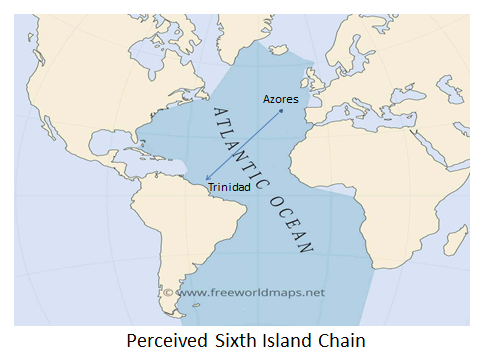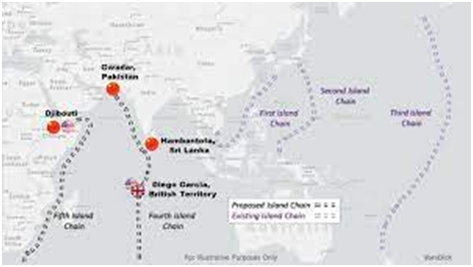
Dr. Hasan Yaser Malik
Island Chain Strategy is a strategic maritime containment plan conceived by an American foreign policy statesman John Foster in 1951, during the Korean War. It proposed of surrounding the Soviet Union and the China with naval bases in the Western Pacific to restrict sea access. Later, due to Soviet Union dissolution, it has remained a major focus for Beijing and Washington’s geopolitical and military analysts. For U.S, this strategy continues assubstantialtool of projection in Far East. For China, the concept is integral to its maritime security and to expand its influence against U.S Defence Strategy Western Pacific. Presently, strategy emphasises on geo-political value of Taiwan.
Frustrating U.S attitude is transforming the strategy to be more flexible, nuanced and multifaceted for Beijing. Initially, three island chains were established in Pacific Ocean; however Center for Strategic and International Studies has proposed the addition of fourth and a fifth island chain to evaluate Chinese Indo-Pacific maritime strategy. The two proposed ones are in the Indian Ocean, which would reflect the growing Chinese interest in the region.

It is perceived that due to increasing strategic competition, China with a view to dominate Blue economy may out play U.S by establishing a Sixth Island Chain in North Atlantic from at Azores archipelago to Trinidad islands stretching over 4500 km to strategically fixmilitary power of an already ocean trapped U.S.Azores archipelago comprising of 9 Islands stretching over 1500 km is an autonomous region of Portugal in mid-Atlantic situated 2,200 miles east of New York City and approximately 900 miles west of Lisbon, thus connecting Europe to America sand Africa with economic, military, and political advantages. U.S has long maintained troops at the Lajes air field on Terceira Island, which helped Americans to secure victories in both WWII and the Cold War over the past decade, Beijing expressed interest in establishing a presence in the Azores as Obama administration slashed 35 million USD in funding of Lajes base, leading to troop’s reduction from 1100 to 178. First indication of Chinese interest was observed during July 2014 once President Xi Jinping flew to the island on his way home from South America.
Portugal is welcoming non-military Chinese engagement even against the wishes of US and its NATO allies. A Chinese foothold will allow Beijing to leverage the islands for immediate diplo-economic gain by utilising logistics centers and fostering lucrative business ventures in Caribbean under its pragmatic Belt Road Initiative. Increased Chinese ingress in North Atlantic will not only enhance its influence to exploit regional politico-military interests but will also reduce the US leverage in South China Sea. China is eager to diversify its export markets and find new sources of energy and natural resources to fuel its growing economy. Portugal is one of the first countries in Western Europe to cooperate with Beijing’s strategic vision of Belt Road Initiative. Chinese companies have invested 5.5 billion euros since 2015 making Portugal the fifth-highest invested nation in the European Union (EU). Chinese state-owned Three Gorges Corporation has purchased 21.47 percent of Energy de Portugal shares. Chinese Huawei has also invested into Portuguese markets since 2018that has laid the foundation for future partnerships in the development of 5G and fiber-optic technologies.The more Portugal relies on Beijing’s investments, the more leverage Beijing can exercise in Atlantic and beyond including Africa and ME.
Reduction of U.S. troops from Lajes dueto budget has created a strategic vacuum which China is eager to fill. Apart from Lajes air base, port of Praia da Victoria being strategically located on Terceira Island can support Chinese transportation of its larger volumes over longer distances.
Portugal’s “golden visa” program that grants residency to those purchasing property valued at more than 500,000 euros provides a legal option for Chinese to owe and exert a greater regional influence. Beijing is also seeking scientific partnerships with Portugal to study paleontology, volcanology, and climate change to enhance its influence in Atlantic. Chinese investments will help Portugal to overcome 30 percent of its economic suffering caused due to reduction of U.S troops from Azores .U. Sis resisting to the idea of Chinese logistics and research centers in proximity of U.S. military base in the Azores, however Beijing’s assistance to Portugal during its debt crisis in 2008 has led to an agreement to construct microsatellites with an amount worth 57 million USD will be launched from a spaceport on the Azores, providing agricultural and oceanographic data.U.S NATO allies also continue to denounce a Beijing foothold in the strategic Azores archipelago as allowing Beijing dual-use of aircraft and shipping vessels would likely hinder any operation and provide China with valuable intelligence. Azores ultimately is likely to emerge as another base including Gwadar and Djibouti.
Beijing’s involvement in Latin America has increased since 2000. Chinese companies are investing in infrastructure, space, ports, shipping and industries, surpassing even the U.S trade. U.S is apprehensive that Beijing is using these rapports to pursue its maritime objectives in Atlantic in response to U.S provocations against it in Indo-Pacific Region, especially South China Sea. For more than half a century, Trinidad and Tobago has been a center of Chinese attention in the Caribbean. Chinese investments in Trinidad include $500 million Chinese-built dry dock. In 2011, China invested $850 million to acquire a 10 percent shares in Atlantic LNG. COSCO has expanded its service like in Azores islands.Huawei and ZTE have also established a strong position market. In the defense and security sector, Trinidad was the first in Western Hemisphere to purchase a Chinese-made military ship, an Offshore Patrol Vessel. It is predicted that by 2035, Chinese market access in Latin American and Caribbean will be 700 billion USD. As per 2015 Defense Strategy White Paper, China is vying to strengthen military ties with Trinidad. However U.S concerns are deepening about Chinese growing presence in Latin America as Washington has shifted its focus toward the Asia-Pacific and the Middle East. U.S being frustrated is imposing sanctions on several Latin American countries to keep its dominance however is failing against China with time at its end to establish 4500 km Sixth Island Chain from Azores to Trinidad to fix U.S which is already trapped in Oceans.
The writer is Ph.D International Relations , Fellow Research Member
with Chartered Institute of Logistics and Transportation (UK)





